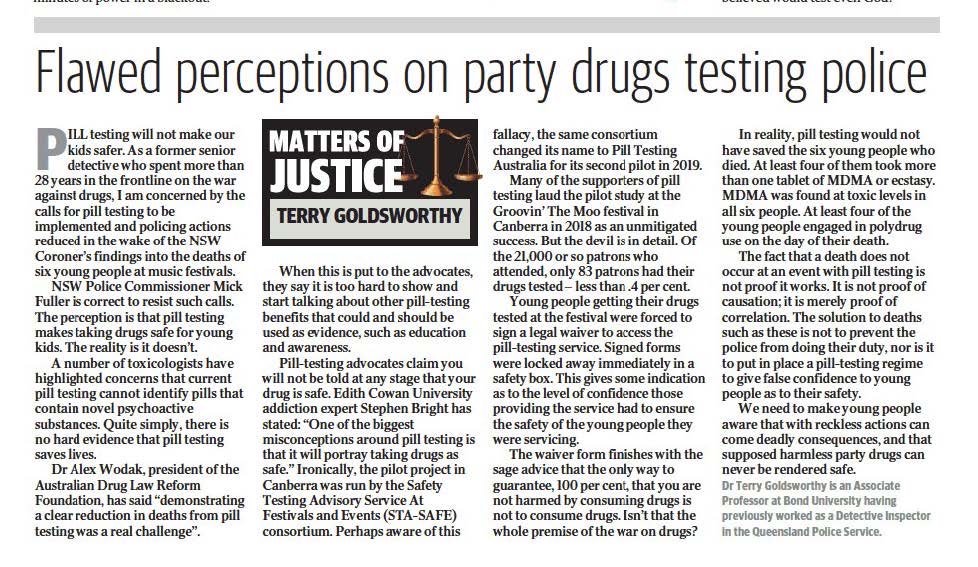Dr Terry Goldsworthy: Flawed Perceptions on Party Drugs Testing Police
 Courier Mail (Aust) November 2019
Courier Mail (Aust) November 2019
Pill testing will not make our kids safer. As a former senior detective who spent more than 28 years in the frontline on the war against drugs, I am concerned by the calls for pill testing to be implemented and policing actions reduced in the wake of the NSW Coroner’s findings into the deaths of six young people at music festivals.
NSW Police Commissioner Mike Fuller is correct to resist such calls. The perception is that pill testing makes taking drugs safe for young kids. The reality is it doesn’t.
A number of toxicologists have highlighted concerns that current pill testing cannot identify pills that contain novel psychoactive substances. Quite simply, there is no hard evidence that pill testing saves lives.
Dr Alex Wodak, president of the Australian Drug Law Reform Foundation, has said “demonstrating a clear reduction in deaths from pill testing was a real challenge”.
When this is put to the advocates, they say it is too hard to show and start talking about other pill-testing benefits that could and should be used as evidence, such as education and awareness.
Pill-testing advocates claim you will not be told at any stage that your drug is safe. Edith Cowan University addiction expert Stephen Bright has stated: “One of the biggest misconceptions around pill testing is that it will portray taking drugs as safe.” Ironically, the pilot project in Canberra was run by the Safety Testing Advisory Service At Festivals and Events (STA-SAFE) consortium. Perhaps aware of this fallacy, the same consortium changed its name to Pill Testing Australia for its second pilot in 2019.
Many of the supporters of pill testing laud the pilot study at the Groovin’ The Moo festival in Canberra in 2018 as an unmitigated success. But the devil is in detail. Of the 21,000 or so patrons who attended, only 83 patrons had their drugs tested – Less than .4 per cent.
Young people getting their drugs tested at the festival were forced to sign a legal waiver to access the pill-testing service. Signed forms were locked away immediately in a safety box. This gives some indication as to the level of confidence those providing the service had to ensure the safety of the young people they are servicing.
The waiver form finishes with the sage advice that the only way to guarantee, 100 per cent, that you are not harmed by consuming drugs is not to consume drugs. Isn’t that the whole premise of the war on drugs?
In reality, pill testing would not have saved the six young people who died. At least four of them took more than one tablet of MDMA or ecstasy. MDMA was found at toxic levels in all six people. At least four of the young people engaged in ploydrug use on the day of their death.
The fact that a death does not occur at an event with pill testing is not proof it works. It is not proof of causation; it is merely proof of correlation. The solution to deaths such as these is not to prevent the police from doing their duty, nor is it to put in place a pill-testing regime to give false confidence to young people as to their safety.
We need to make young people aware that with reckless actions can come deadly consequences, and that supposed harmless party drugs can never be rendered safe.
Dr Terry Goldsworthy is an Associate Professor at Bond University having previously worked as a Detective Inspector in the Queensland Police Service.






